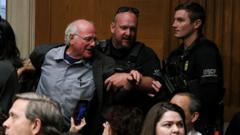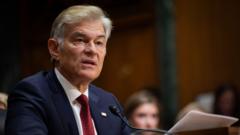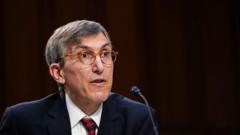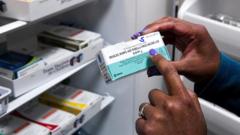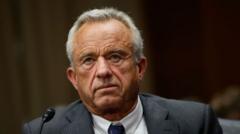**The decision has raised alarms among health experts who argue mRNA technology is vital for pandemic preparedness and effectiveness against respiratory diseases.**
**Funding Cut for mRNA Vaccine Development Sparks Controversy**

**Funding Cut for mRNA Vaccine Development Sparks Controversy**
**The US government halts $500 million in funding for mRNA vaccine projects under Health Secretary RFK Jr, citing safety concerns.**
The US Department of Health and Human Services (HHS) has made a contentious decision to scrap $500 million in funding aimed at the development of mRNA vaccines designed to combat respiratory viruses like the flu and Covid-19. This move affects 22 projects associated with major pharmaceutical companies such as Pfizer and Moderna, leading to concerns over the implications for future health crises.
Health Secretary Robert F. Kennedy Jr., known for his skepticism about vaccines, announced the funding withdrawal, arguing that "mRNA technology poses more risks than benefits for these respiratory viruses". His statements have sparked backlash from health professionals who argue such a stance contradicts the evidence supporting the effectiveness of mRNA vaccines in battling pandemics. Peter Lurie, a former FDA official, emphasized that terminating funding for mRNA projects signifies a serious regression in the United States' ability to prepare for imminent viral threats.
Kennedy defended his decision, asserting that a thorough review concluded that mRNA vaccines are inadequate in preventing infections from upper respiratory illnesses. He indicated a shift in focus towards vaccines with better safety profiles and the potential to remain effective even amid viral mutations. However, experts like Dr. Paul Offit from Children's Hospital of Philadelphia challenged Kennedy's claims, indicating that viruses naturally mutate with or without vaccines, and underscored the proven safety and importance of mRNA vaccines in preventing severe viral infections.
The Biomedical Advanced Research and Development Authority (BARDA), which oversees these vaccine projects, has reassured its commitment to supporting vaccine platforms that have demonstrated stronger safety records. Critics of the funding cancellation warn that this reallocation could leave the country vulnerable to future pandemics, as mRNA technology is highlighted for its rapid development cycle, key to the swift response to Covid-19.
Kennedy’s leadership has seen significant shifts, including the dismissal of a committee responsible for vaccine recommendations, replaced by figures skeptical of vaccine safety. This has intensified debates surrounding vaccine policies in the US, leaving public health officials alarmed about the potential ramifications for immunization strategies and overall public health safety.
Health Secretary Robert F. Kennedy Jr., known for his skepticism about vaccines, announced the funding withdrawal, arguing that "mRNA technology poses more risks than benefits for these respiratory viruses". His statements have sparked backlash from health professionals who argue such a stance contradicts the evidence supporting the effectiveness of mRNA vaccines in battling pandemics. Peter Lurie, a former FDA official, emphasized that terminating funding for mRNA projects signifies a serious regression in the United States' ability to prepare for imminent viral threats.
Kennedy defended his decision, asserting that a thorough review concluded that mRNA vaccines are inadequate in preventing infections from upper respiratory illnesses. He indicated a shift in focus towards vaccines with better safety profiles and the potential to remain effective even amid viral mutations. However, experts like Dr. Paul Offit from Children's Hospital of Philadelphia challenged Kennedy's claims, indicating that viruses naturally mutate with or without vaccines, and underscored the proven safety and importance of mRNA vaccines in preventing severe viral infections.
The Biomedical Advanced Research and Development Authority (BARDA), which oversees these vaccine projects, has reassured its commitment to supporting vaccine platforms that have demonstrated stronger safety records. Critics of the funding cancellation warn that this reallocation could leave the country vulnerable to future pandemics, as mRNA technology is highlighted for its rapid development cycle, key to the swift response to Covid-19.
Kennedy’s leadership has seen significant shifts, including the dismissal of a committee responsible for vaccine recommendations, replaced by figures skeptical of vaccine safety. This has intensified debates surrounding vaccine policies in the US, leaving public health officials alarmed about the potential ramifications for immunization strategies and overall public health safety.








